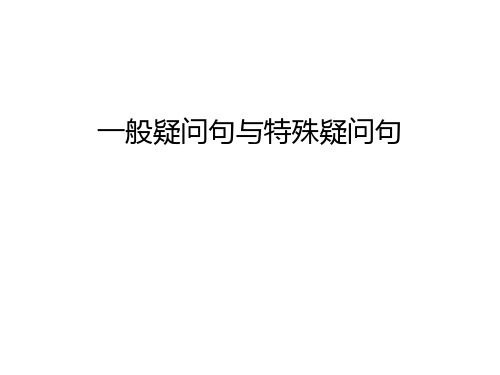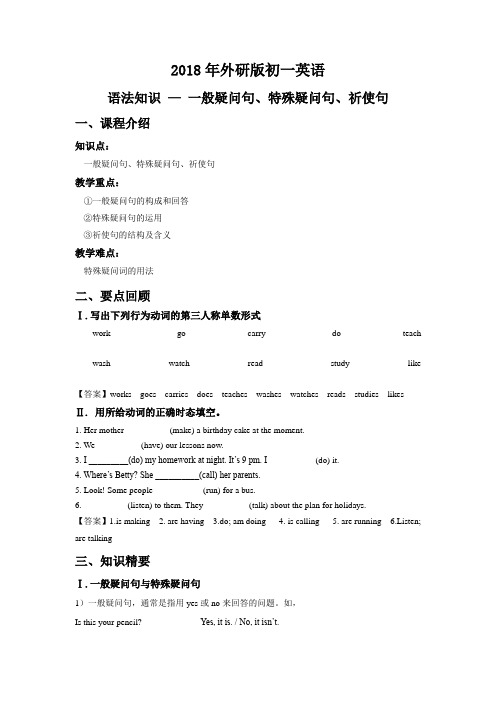初中英语一般疑问句与特殊疑问句小结教案资料
一般疑问句和特殊疑问句讲解及练习讲课教案

一般疑问句和特殊疑问句讲解及练习一般疑问句在英语的学习中,一般疑问句的转换及回答是经常碰到的问题,现在我们就来探讨一下有关一般疑问句的问题。
一、什么是一般疑问句用Yes或No作答的疑问句叫一般疑问句。
一般疑问句还有下列特点:1、以be动词、助动词或情态动词开头;例:Is your father a teacher? Does Catherine like animals? Can Jenny speak French?2、往往读升调;3、译成汉语,都可以带上“吗”,例如上面三句可分别译为:你父亲是老师吗?凯瑟琳喜欢动物吗?詹妮会说法语吗?二、例何将陈述句变成一般疑问句?要将陈述句变成一般疑问句,可以遵循下列步骤:1.看句中有没有be动词(am、is、 are、 was、 were)、助动词(do、does、did、 have、 had)或情态动词(can、must、will、may等),如果有,将其提到句首,句末打上问号即可。
例:It was rainy yesterday.→Was it ra iny yesterday?Tom's father can play the piano.→Can Tom's father play the piano?I have finished my homework.→Have you finished your homework?2.如果句中没有be动词、助动词或情态动词,则根据谓语动词的形式借助do的相应形式放在句首。
具体方法是:如果谓语动词是原形,则借do;如果谓语动词是一般现在时第三人称单数形式,则借does;如果谓语动词是过去式,则借did. 需要注意的是,借does或did后,原句的谓语动词要变回原形。
例:They go to school by bike.→Do they go to school by bike?Bill gets up at 6:30 every day.→Does bill gets up at 6:30 every day?The students saw a film yesterday.→Did the students see a film yesterday?三.陈述句变一般疑问句应注意的事项陈述句变成一般疑问句除了遵循上述规则以外,还应注意下列几点:1.如果陈述句中有第一人称,则变问句时最好要变为第二人称。
疑问句一般疑问句特殊疑问句公开课教学课件

7.Mike is 1.35 meters tall.
How tall is Mike?
8.I’ll bring it here in a minute.
How soon will yo列划线部分提问
4. Did Eddie play football?
Yes, he did. No, he did not./No, he didn`t.
特殊疑问句
(Special question)
特殊疑问句的形式:疑问代词/副 词 + 动词 be/助动词/情态动词 + 主语 + 动词。疑问代词/副词包括 what, who, which, whom, whose, when, how, why, where 等。回 答时不用yes 或no,而要根据实际 情况回答。
“明天谁来看你?” “我爸爸。”
➢ whose----Possession (对人的所有关系提问) e.g “Whose book is this?” “It is my brother’s.”
“这是谁的书?” “是我弟弟的。”
➢ when----Time (对时间提问) e.g “When will you finish your homework?”
offer Request
Does he give you ___a_ncyakes? He gives mes_o_m___e cakes.
He doesn't give me __a_n_ ycakes. Would you like _____ cakess?ome
Can I have s_o__m__ecakes?
初中英语一般疑问句和特殊疑问句知识点总结

疑问句最常见的疑问句有两类:1.一般疑问句:可以用Yes和No回答的问句2.特殊疑问句:以特殊疑问词(比如what/how等等)开头的疑问句一般疑问句(句型结构会根据时态发生相应的细微变化,但总体框架不变)①be动词+主语+其他?(注意be动词和主语的匹配)例句:Are you a policeman?你是个警察吗?-Yes,I am.是的,我是。
-No,I am not.不,我不是。
②情态动词+主语+动词原形+其他?(注意情态动词后面跟动词原形)例句:Can you swim?你会游泳吗?-Yes,I can.是的,我会。
-No,I can’t.不,我不会。
③助动词+主语+动词原形+其他?(注意助动词和主语的匹配)例句:Do you like dancing?你喜欢跳舞吗?-Yes,I do.是的,我喜欢。
-No,I don’t.不,我不喜欢。
Do you go to school every day?你每天去学校吗?做句型转换的方法(如何将陈述句变成一般疑问句):先看句子中是否有be动词或者情态动词A.如果有be动词或者情态动词,对照一般疑问句句型①/②将be动词或者情态动词提前,移到句首,其他部分依次照抄B.如果没有be动词或者情态动词,对照一般疑问句句型③句首+助动词(注意是否要和主语匹配变化),其他部分依次照抄,注意原来的动词要变为原形#无论是哪一种情况,都要注意第一人称要变成第二人称,第二人称要变成第一人称特殊疑问句(句型结构会根据时态发生相应的细微变化,但总体框架不变)①特殊疑问词(作主语)+谓语+其他?(陈述句语序)例句:Who is reading a book?谁正在读书?Which is the biggest?哪个是最大的?Who likes dancing?谁喜欢跳舞?②特殊疑问词(作主语修饰语)+主语+谓语+其他?(陈述句语序)例句:Whose bag is red?谁的包是红色的?How many people work in the school?有多少人在学校工作?③特殊疑问词+一般疑问句(详见上面的一般疑问句结构)?(此情况为当特殊疑问词代替的部分不是主语或者主语修饰语时)例句:What are you doing?你在做什么?What colour do you like?你喜欢什么颜色?做句型转换的方法(如何将句子转变成特殊疑问句):先看划线部分是否为句子中的主语或者主语修饰语A.如果是主语,对照特殊疑问句句型①划线部分用特殊疑问词代替,其他部分照抄(该疑问句为陈述句语序)B.如果是主语修饰语,对照特殊疑问句句型②划线部分用特殊疑问词代替,其他部分照抄(该疑问句为陈述句语序)C.如果不是主语或者主语修饰语,对照特殊疑问句句型③先将原来的陈述句变成一般疑问句(如果本来就是一般疑问句就不需要再做修改)划线部分用特殊疑问词代替再将特殊疑问词提前到句首#如果划线部分是用作谓语的动词或者动词短语(即有时态和性数变化,需要和主语匹配的动词),表示做什么事,那么划线部分变为特殊疑问词的时候要用do what代替(do要与原动词时态性数一致)#如果划线部分不做主语也不做主语修饰语,但是划线部分为修饰语,后面紧跟着名词,这时候用疑问词代替划线部分后,要连同后面的名词一同提到句首特殊疑问词主要分为两类:wh-(wh开头的疑问词)和how-(how开头的疑问词)疑问词含义用法what什么问东西who谁问人whose谁的问归属which哪一个问选择where在哪里问地点when什么时候问时间why为什么问原因what for为什么问原因what colour什么颜色问颜色what day星期几问星期what date什么日期问日期what time几点钟问时间what about……怎么样问意见how怎么样问方式,问情况how old多大问年龄how heavy多重问重量how tall多高问身高how many多少个问数量how much多少/多少钱问数量/价格how long多长/多长时间问长度/时间how soon多久以后问时间how far多远问距离how often多久一次问频率how about……怎么样问意见。
一般疑问句和特殊疑问句的教案

一般疑问句和特殊疑问句的教案1. 嘿,你知道一般疑问句就像个好奇宝宝,总在问“是不是呀”?比如“你吃饭了吗”。
特殊疑问句呢,就像是个爱追问细节的小侦探,非得问个“为什么”“怎么样”之类的。
像“你为什么喜欢这本书呀”。
2. 哇塞,一般疑问句是不是就像在轻轻敲你的门,问你“在吗”?就像“今天开心吗”。
特殊疑问句可就厉害啦,像拿着放大镜在观察,问“这个多少钱呀”。
3. 哎呀,一般疑问句不就是那简单直接的一问嘛,像“你喜欢我吗”。
特殊疑问句可复杂些咯,好比“你什么时候回来呀”。
4. 嘿呀,一般疑问句是不是经常让你做选择呀,比如“你去还是不去呀”。
特殊疑问句就像是在深挖你的想法,问“你怎么做到的呀”。
5. 哇哦,一般疑问句有时候就像个小提示,问“准备好了吗”。
特殊疑问句则像是打破砂锅问到底,比如“你在哪里买的呀”。
6. 哟呵,一般疑问句就好像在试探你呢,问“是不是这样呀”。
特殊疑问句可就具体啦,像“你最喜欢什么颜色呀”。
7. 嘿,一般疑问句不就像个小询问,像“你会游泳吗”。
特殊疑问句那可是有针对性的呀,比如“你用什么方法记住的呀”。
8. 哎呀呀,一般疑问句有时就像在逗你玩,问“你想不想吃呀”。
特殊疑问句可就严谨多了,问“你多大了呀”。
9. 哇,一般疑问句是不是像个小敲门砖呀,比如“你有空吗”。
特殊疑问句那可是在深挖你的情况呢,比如“你从哪里来呀”。
10. 嘿哟,一般疑问句不就是那简单的一问嘛,像“你懂了吗”。
特殊疑问句就像是在探寻秘密,问“你为什么这么厉害呀”。
我的观点结论就是:一般疑问句和特殊疑问句都超有意思,能让我们的交流变得丰富多彩呀!。
初一英语上学期语法一般疑问句及特殊疑问句

单击添加副标题
单击此处添加文本具体内容,简明扼要地阐述你的观点
一般疑问句
什么是一般疑问句 用Yes或No作答的疑问句叫一般疑问句。一般疑问句还有下列特点: 以be动词、助动词或情态动词开头; 例:Is your father a teacher? Does Catherine like animals? Can Jenny speak French? 往往读升调; 译成汉语,都可以带上“吗”,例如上面三句可分别译为:你父亲是老师吗?凯瑟琳喜欢动物吗?詹妮会说法语吗?
02
如果句中含有实义动词have且表示“有”时, 使用do
04
→Do you have any friends in America?
06
四.一般疑问句的回答 一般疑问句往往采用简短回答,共由三部分(三个单词)组成,对这三部分(三个单词)的确定可以概括例下: 1.第一个词:不是Yes就是No。(有时根据语气的不同,Yes可由Sure, Certainly, Of course等代替.NO可由sorry 代替.) 2.第二个词:问谁答谁。即答语中的主语须与问句的主语一致(但必须用主格代词)。 例:Does she clean her room every day? Yes, she does. Is Anna′s father a doctor? No,he isn′t. 如果主语是 this that,回答时用 it 代替,如果问句中主语these, those,回答时用 they′ 代替。
How do you know﹖
01
03
05
02
04
06
特殊疑问词+助动词+主语+动词原形+其他?
一般疑问句和特殊疑问教案及练习

一般疑问句和特殊疑问句教案及练习一、教学目标1. 让学生理解一般疑问句和特殊疑问句的概念。
2. 让学生掌握一般疑问句和特殊疑问句的构成和用法。
3. 培养学生运用一般疑问句和特殊疑问句进行交际的能力。
二、教学内容1. 一般疑问句:以“be动词/助动词/情态动词+主语+谓语动词+其他?”的形式构成,用来询问某人或某物的情况。
2. 特殊疑问句:以“特殊疑问词+be动词/助动词/情态动词+主语+谓语动词+其他?”的形式构成,用来询问某人的个人信息、物品的特征等。
三、教学重点与难点1. 教学重点:一般疑问句和特殊疑问句的构成和用法。
2. 教学难点:一般疑问句和特殊疑问句在实际交际中的应用。
四、教学方法1. 任务型教学法:通过设计各种任务,让学生在实际操作中学会使用一般疑问句和特殊疑问句。
2. 交际法:通过模拟真实场景,让学生在交际中学会运用一般疑问句和特殊疑问句。
五、教学步骤1. 引入:向学生介绍一般疑问句和特殊疑问句的概念,让学生初步了解它们的用法。
2. 讲解:详细讲解一般疑问句和特殊疑问句的构成和用法,举例说明。
3. 练习:设计各种练习题,让学生分组练习,巩固所学知识。
4. 情景模拟:设置不同场景,让学生运用一般疑问句和特殊疑问句进行实际交际。
六、教学活动1. 小组讨论:学生分组讨论一般疑问句和特殊疑问句在日常生活中的应用场景。
2. 角色扮演:学生分组进行角色扮演,模拟实际场景,运用一般疑问句和特殊疑问句进行交际。
3. 问答游戏:教师提问,学生用一般疑问句和特殊疑问句回答,增强学生的实际应用能力。
七、课堂作业1. 完成练习册上的相关练习题。
2. 编写一个短剧,运用一般疑问句和特殊疑问句进行交际。
八、课后作业1. 复习课堂内容,重点掌握一般疑问句和特殊疑问句的构成和用法。
九、教学评价1. 课堂表现:观察学生在课堂上的参与程度、回答问题的情况等。
2. 练习完成情况:检查学生完成练习册上的练习题的情况。
3. 短剧表演:评价学生在短剧中的表现,以及运用一般疑问句和特殊疑问句的能力。
一般疑问句与特殊疑问句教案资料

特殊疑问句
特点是用疑问词开头,由于疑问词是w或h作词 首。
常用来对句子的某一成分进行提问,问具 体的人或事、时间、地点、原因等,不能用yes或no 来进行简单回答。
—What class are you in?
—I’m in Class Four, Grade One.
结构:疑问词 + 一般疑问句 (1)What is this?
口诀 :
先找am, is, are, was, were或can放在最前面,
如没有则判断是否为过去式,是则动词改为原形,
句前加Did,
不是过去式则判断是否为第三人称单数,是则动词 改为原形,句前加Does,
不是第三人称单数,则句前加Do。
句型转换
1. Mr. Green comes from Shanghai. (改为一般疑问句)
→Are there any books on the desk?
and or
变否定句时,and要变成or
There is some air and源自water on the moon .
→ There isn't any air or water on the moon. He has some brothers and sisters. →He doesn’t have any brothers or sisters.
(改为一般疑问句并做肯定回答)
Does Daniel enjoy playing computer games?
Yes, he does.
some、any
一般说来,some 用于肯定句中,any 用于否定句和疑 问句中 。
改疑问句或否定句时,原句里的some要改成any
【2018年外研版初一英语】语法知识-一般疑问句、特殊疑问句、祈使句-教案

2018年外研版初一英语语法知识—一般疑问句、特殊疑问句、祈使句一、课程介绍知识点:一般疑问句、特殊疑问句、祈使句教学重点:①一般疑问句的构成和回答②特殊疑问句的运用③祈使句的结构及含义教学难点:特殊疑问词的用法二、要点回顾Ⅰ.写出下列行为动词的第三人称单数形式work __________ go __________ carry __________ do __________ teach __________wash __________ watch __________ read __________ study __________ like __________【答案】works goes carries does teaches washes watches reads studies likes Ⅱ.用所给动词的正确时态填空。
1. Her mother __________(make) a birthday cake at the moment.2. We __________(have) our lessons now.3. I _________(do) my homework at night. It’s 9 pm. I __________ (do) it.4. Where’s Betty? She __________(call) her parents.5. Look! Some people ___________(run) for a bus.6. __________(listen) to them. They __________(talk) about the plan for holidays.【答案】1.is making 2. are having 3.do; am doing 4. is calling 5. are running 6.Listen; are talking三、知识精要Ⅰ.一般疑问句与特殊疑问句1)一般疑问句,通常是指用yes 或no来回答的问题。
- 1、下载文档前请自行甄别文档内容的完整性,平台不提供额外的编辑、内容补充、找答案等附加服务。
- 2、"仅部分预览"的文档,不可在线预览部分如存在完整性等问题,可反馈申请退款(可完整预览的文档不适用该条件!)。
- 3、如文档侵犯您的权益,请联系客服反馈,我们会尽快为您处理(人工客服工作时间:9:00-18:30)。
初中英语一般疑问句与特殊疑问句小结一般疑问句与特殊疑问句小结I. 一般疑问句1. 概念能用yes / no(或相当于yes / no)回答的问句叫一般疑问句。
2. 含系动词be的一般疑问句的构成具体地说,就是当陈述句中有am /is / are时,可直接将它们提至主语前,但如遇第一人称,最好将其置换成第二人称。
如:I'm in Class 2, Grade 1. →Are you in Class 2, Grade 1? 你是在一年级二班吗?It's a m ap of China. →Is it a map of China? 这是一幅中国地图吗?3. 含情态动词的一般疑问句的构成一般疑问句面前人人平等:情态动词与am / is / are一样,也可直接将它们提至主语前,所以问题迎刃而解了。
如:I can spell it. →Can you spell it? 你会拼写它吗?4. 含实义动词的一般疑问句的构成含实义动词的一般疑问句的构成稍微有点讲究,要在句首加do;如逢主语为第三人称单数,谓语动词为一般现在时单数第三人称形式"v-(e)s"时,奉does为座上宾并要变回原形(如has→have,likes→like等);有时陈述句中的some还要变作any等。
如:She lives in Beijing. →Does she live in Beijing? 她住在北京吗?I like English. →Do you like English? 你喜欢英语吗?There are some books on my desk.→Are there any books on your desk?5. 少数口语化的一般疑问句如问一个与前文相同的问句时,可省略成"And you?"或"What / How about...?"等;甚至只抓关键词,读作升调。
如:Your pen? 你的钢笔?6. 小插曲:一般疑问句的语调大部分的一般疑问句都应读作升调(↗),并落在最后一个单词身上。
如:Is it a Chinese car↗?7. 一般疑问句的应答用yes / no(或相当于yes / no的词)回答,并怎么问怎么答(句首为情态动词am / is / are还是do /does),简略回答时要注意缩写(否定的n't)和采用相应的人称代词以避免重复:即"Yes,主语(代词)+情态动词或am / is /are或do / does."表示肯定;"No,主语(代词)+情态动词或am / is / are或者do / does not(n't)."表示否定。
如:① -Is Mary a Japanese girl? 玛丽是日本女孩吗?-Yes, she is. / No, she isn't. 是的,她是。
/不,她不是。
② -Can Lily speak Chinese? 莉莉会说中国话吗?-No, she can't. / Sorry, I don't know. 不,她不会。
/对不起,我不知道。
③ -Do you like English? 你喜欢英语吗?-Yes, very much. 是的,非常喜欢。
II. 特殊疑问句1. 定义以特殊疑问词开头,对陈述句中的某一部分提出疑问 / 进行发问的句子叫特殊疑问句。
2. 特殊疑问词全搜索一句话: wh-开头外加能与之结伴同行的名词; how及它的形容词兄弟姐妹们,即如: what, where, which, what class, what time, what number; how,how many, how old, how much等。
3. 特殊疑问句的构成特殊疑问句由"特殊疑问词+一般疑问句"构成:How old are you? 你多大了?What's this in English? 这个用英语怎么讲?Who's not here today? 今天谁没来?Which pen is red? 哪枝钢笔是红色的?4. 特殊疑问句的语调一般说来,特殊疑问句都要读成降调(↘),并往往让最后一个单词承担此重任。
如:What row are you in(↘)? 你在第几排?Where is"E" (↘)? "E"在哪里?5. 对特殊疑问句的答复回答特殊疑问句,不能用"yes / no";但可用"到什么山上唱什么歌"来形容对特殊疑问句的应答- -即问什么答什么(尤其是简略回答更明显)。
如:-How old is your sister? 你妹妹今年多大了?-She's only five. / Only five. (她)才5岁。
III. 专项训练。
1. 根据回答写出相应的问句(一空一词)。
① -______ ______are the twins in? -They are in Row 4.② -______is your father? -Fine, thank you.③ -______Li Lei______8? -No, he is Number 6.④ -______6 plus three? -It's 9.⑤ -______that, please? -This is Mr Green.2. 按要求进行句型转换。
①Mary is at home. (对划线部分提问)②Eleven minu s six is five. (对划线部分提问)③We're in the same class. (改成一般疑问句并作否定回答)④My English teacher is Miss Hu.(对划线部分提问)⑤The twins ar e twelve now. (改成一般疑问句并作肯定回答) 一,把下列陈述句变成一般疑问句。
1. Li Lei is at home today.2. I go to school on my bike.3. He can see a bird in the tree.4. There are some apples in the basket.二、把下列肯定句变成否定句。
5. He is in a red sweater.He ______ in a red sweater.6. I can see some pictures on the wall in the classroom.I ______ ______ ______ pictures on the wall in the classroom.7. Colour it green, please.Please ______ ______ it green.8. Li Lei and his friends like to play in the tree house.Li Lei and his friends ______ ______ to play in the tree house.9. I think he is very old.I ______ ______ he is very old.三、对划线部分提问。
1. Jill is fine. ______ is Jill?2. My brother is in a black car. ______ ______ your brother?3. The man in a black car is my brother.______ ______ is your brother?4.The red shirt is Li Ming’s. ______ is the red shirt?5. His coat is green. ______ ______ is his coat?6. There is only one pen in her pencil-box.______ ______ ______ ______ there in her pencil-box?四、同义句转化。
1. A: His father is a teacher. His mother is a teacher, too.B: His ______ are both(都) ______.2. A: Is she like her dad?B: ______ she ______ like her dad?3. A: What’s the time?B: ______ ______ ______ ______?4. A: My shirt is blue. Is his shirt blue, too?B: My shirt is blue. ______ ______ ______?5. A: It’s time for supper.B: It’s time ______ ______ supper.. 6. A: What other things can you see in the picture?B: What ______ can you see in the picture?7. A: Let’s go and look at the bird in the tree.B: Let’s go and ______ ______ ____ at the bird in the tree.8. A: Please sit down. B: Please ______ ______ ______. 英语句型转换:主要涉及肯定句、否定句、一般疑问句的互换、祈使句的肯定和否定形式、单复数句型的转换、反意疑问句。
1.I know the answer.(一般疑问句)______ ______ know the answer?2.We can see some birds.(一般疑问句)______ ______ see ______ birds?3.There is a computer in my house.(一般疑问句)______ ______ a computer in house?4.There are some flowers on the teachers’desk.(一般疑问句) ______ ______ ______ flowers on the teachers’desk?5.There are some apples on the tree.(否定式)There ______ ______ ______ apples on the tree.6.I think he is very old.(否定句)I ______ think he ______ very old.7.Thank you for helping me.(同义句)Thank you for ______ ______ .8.There aren’t any pears in the box.(同义句)There are ______ pears in the box.9.Whose are these clothes?(同义句)______ ______ are these?1. They are elephants .(变该句为单数形式)2. We have two maths classes .(改为一般疑问句)3. There is a computer on the desk .(改为一般疑问句)4. There is some bread in the bag .(改为一般疑问句)5. I do project work in the club .(变该句为复数形式)6. There is some water in the bottle .(否定句)7. There are five elephants in the picture .(单数)8. Take him to the school .(否定句)Reading:(1)Too PoliteThere are many people in the bus. Some have seats, but some have to stand. At a bus stop, a woman gets on the bus. An old man hears the door and tries to stand up.“Oh, no, thank you,” the woman forces (强迫) him back to the seat. “Please don't do that. I ca n stand.”“But, madam, let me…,”says the man.“I ask you to keep your seat,” the woman says. She puts her hands on the old man's shoulder.But the man still tries to stand up,“Madam, will you please let me…?”“Oh, no,”says the woman. She again forces the man back.At last the old man shouts, “I wants to get off the bus!”( )1.All the people have seats in the bus.( )2.An old man gets on the bus at a bus stop.( )3.The old man wants to give his seat to he woman.( )4.The woman sits the old man's seat.( )5.The old man wants to get off the bus.(2)Most people who work in the office have a boss. So do I . But my boss is a little unusual. What's unusual about him? It's a big dog. Many men have dogs,but few men bring their dogs to the office every day. My boss's dog. Robinson, is big and brown. My boss brings him to work every day. He takes the dog to meetings and he takes the dog to lunch. When there is telephone call for my boss, I always know if he is in the office. I only look under his desk. If I see something brown and hairy (毛绒绒的) under it, I know my boss is somewherein the office. If there is no dog , I know my boss is out.()6. People _________bring dogs to the office.A. usuallyB. oftenC. seldomD. sometimes()7. My boss is Robinson's ________.A. bossB. masterC. classmateD. teacher()8. Robinson goes to meetings _________ my boss.A. forB. withoutC. instead ofD. with()9. Robinson is always under the desk if the boss is _________.A. in the officeB. at meetingsC. out of the officeD. out of work()10. The passage tells us the boss _________ the dog very much.A. looks likeB. hatesC. likesD. trust。
